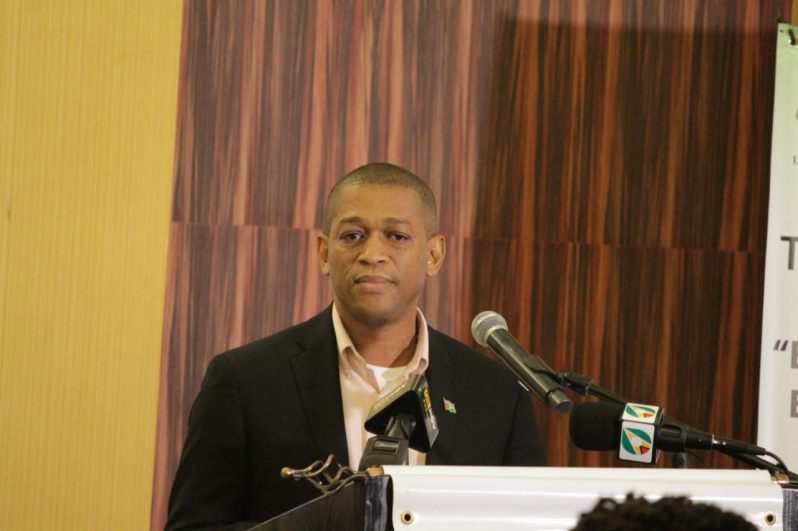AS Guyana’s oil and gas industry evolves, the nation must prepare itself for an expanded energy sector and the development expected to be fostered by the Green State Development Strategy (GSDS).
Head of the Department of Energy Dr Mark Bynoe made this point while delivering remarks at the University of Guyana’s (UG’s) Turkeyen and Tain Talks 18 on Thursday, which focused on Energy for Guyana, Renewable Energy, Oil, Gas and Guyana’s Green Future.
“Energy is not an end in itself,” Dr. Bynoe explained. “It is what it can be used for- how it can transform the lives and the livelihoods of all Guyanese,” he said.
Guyana’s recent hydrocarbon [oil and gas] discoveries and their subsequent development, production and revenue generation have to potential to place the country on a development pathway, Dr Bynoe said ,and he made known that this pathway has already been articulated as the GSDS.
The GSDS is premised on sustainably utilising the country’s natural resource wealth, including- but not limited to- those hydrocarbon resources; supporting economic resilience and building the human capital of Guyana.
The question that is often asked however, according to the Director, is whether the “green state ethos” counters the pursuance of a hydrocarbon economy. “The answer for me is a resounding not necessarily,” he half-quipped.
As continuously articulated by President David Granger, the GSDS as a development paradigm aiming to sustain economic prosperity, environmental security and social well-being. “It is not just about energy, it is a development paradigm,” Bynoe pointed out.
“While there continues to be substantial discussions around the utilisation of the oil revenues, the hydrocarbon resources revenues are expected to be the catalyst for growth and funding of the GSDS,” he said.
However, if the country decides to pursue cheap and reliable energy, including for value-addition in other sectors then, Bynoe explained, the country must be able to understand where the growth sectors are and be able to target and put resources there.
“We are already seeing an increasing demand for energy,” he highlighted, adding: “With increasing temperatures, there will also be a need for more cooling effects, driving the demand for more energy again.” There is also a need for energy efficiency and investments in renewable energy, he reminded.
This expansion of the energy sector is one which augurs well for a well-implemented GSDS, according to Dr Bynoe, who stressed that it will be important for Guyana to ensure that its development in the hydrocarbon sector is complementary with that strategic intent.
“Revenues from offshore will allow choices to be made with regards to onshore development, to ensure compliance with the GSDS,” he said. “The critical aspect here is whatever Guyana does with its revenues, and as we pursue a Green State ethos, let it be strategic and let us be able to pursue what is termed a ‘no-regrets’ measure.”
This “No-regrets” measure, he noted, involves being wary of the dreaded resource curse- known commonly as the Dutch Disease.
This “curse” or “disease” occurs when there is an increase in the economic development of a specific sector and a decline in other sectors, and cognisant of this, Bynoe stressed that the focus cannot just be on oil gas and on renewable gas. Instead, he stressed that focus must be given to a multiplicity of other growth sectors and seeking to ensure that those value chains are explored.
And as the country hopes to move to more renewable energy sources, he contended that the transition would encompass some caveats.
“A rapid large scale energy transition creates extra demands for energy sources and these demands will compete with other economic activity,” he said. And for him, this is something that Guyana really needs to safeguard against given its relatively small capable and competent workforce.
Cognisant of what Guyana wants to achieve and those factors that could present issues to the country’s agenda, the head of the energy department also stressed that there must continue to be engagement with and decision-making among all stakeholders, beyond those persons in Region Four and on the coastline and beyond those who have technical knowledge.



.jpg)









